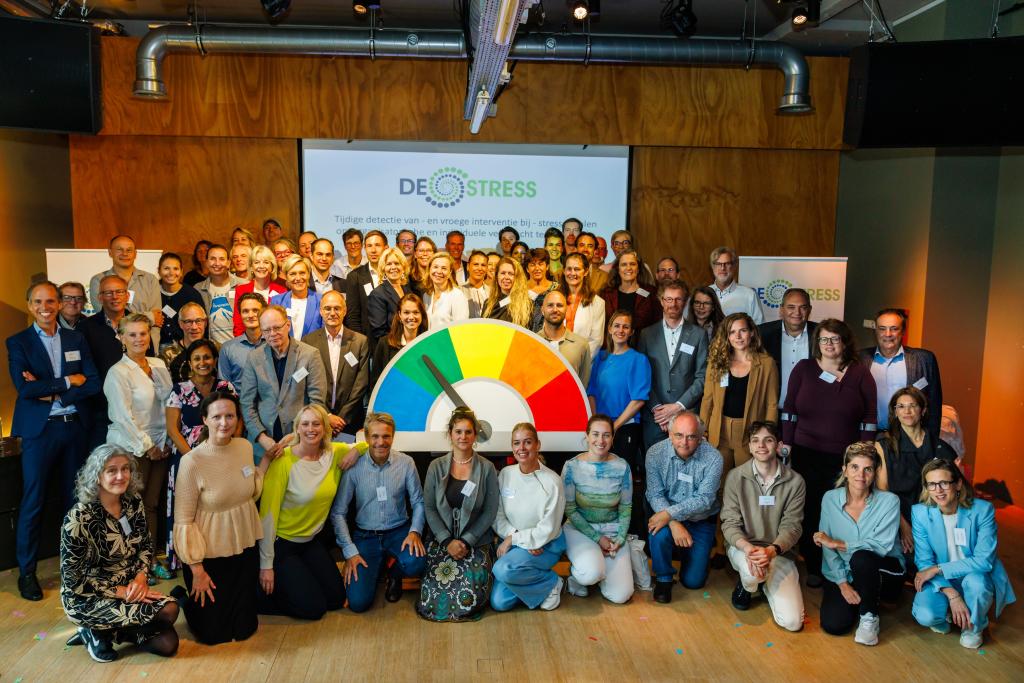DESTRESS launch: tackling workplace stress before it is too late

This initiative focuses on the early recognition of stress in employees. Initiator Christiaan Vinkers, psychiatrist and professor of Stress and Resilience: "At a time when stress levels are reaching unprecedented heights, the impact of stress on both employees and organisations is huge. Every year, mental health issues cause millions of days of absenteeism and billions of euros in costs, and rising. By taking an innovative approach, we want to break this pattern. By recognising stress at an early stage, employees, employers and occupational health professionals can do something about it together before it is too late."
A healthier and more resilient working population in the Netherlands
Stress in the workplace can be caused by issues at work or at home. However, identifying and discussing stress symptoms is not always easy. Rising stress levels may consequently be noticed too late, resulting in people sometimes dropping out long term. In DESTRESS, reliable stress signals are measured, using wearables for example, and the causes analysed, both at home and in the work environment. "This combination of signals and factors are then fed back with an AI-based application in an ethical and safe way," says Noortje Wiezer, principal consultant at the Healthy Living & Work Unit of knowledge institute TNO: “In this way, we strengthen the dialogue between employees and employers, supported by occupational health professionals where necessary. Stress does not then get a chance to escalate, and we contribute to creating a healthier and more resilient working population in the Netherlands."
Collaboration between science and practice
DESTRESS will be implemented over the next eight years by a multidisciplinary public-private consortium and funded by the Dutch Research Council (NWO). Researchers, professionals and practitioners will be working with employers, unions, Ministries and professional associations to measure stress signals and develop the application. Occupational health services also play a crucial role in the project. "To prevent and reduce stress-related absenteeism, we use the practical expertise of our occupational health professionals, anonymised data and our network of organisations where measurements can be taken," says Jurriaan Penders, director of medical affairs at HumanTotalCare. Medical Director Talitha de Haas from the paraDIGMA group adds: "This collaboration between science and practice is unique. And because we have both been involved in the project from the start, we will immediately be able to implement the application."
Committed to a healthier working population in the Netherlands
More than one in every five days of absence is related to stress. This is based on figures from the occupational health and safety service providers ArboNed and HumanCapitalCare, both part of HumanTotalCare and jointly serving over 1 million employees. Penders: "Scientific research helps us provide the best possible support to employers and employees. DESTRESS can ensure that stress is identified, acknowledged and discussed sooner. Stress-related absenteeism is a social problem that we need to tackle together. For that reason, HumanTotalCare is committed to DESTRESS as its largest practice partner."
Working together for change in the Netherlands
On 12 September, all the partners in the DESTRESS consortium met for the first time at the Volkshotel in Amsterdam for a festive and flying start. "In this consortium, the partners can optimally benefit from each other's expertise. Whether it is determining what is ethical and legally permissible or measuring stress factors for organisations and employees, we need to work together. During the launch, we therefore encouraged knowledge sharing and created small coalitions so that people can easily find each other," Vinkers said. To make DESTRESS known to the general public, podcasts were also recorded during the launch. "My dream is that the whole of the working population of the Netherlands benefits from DESTRESS. Which is why my consortium partners and I are keen to explain in simple terms how they can benefit from it."
About the DESTRESS partners
DESTRESS will be implemented by a multidisciplinary, public-private consortium. Firstly, a wide range of researchers are connected from Amsterdam UMC, VU Amsterdam, Radboud University, Radboud University Medical Center, Donders Institute, TNO, University Medical Center Utrecht, Hanze University of Applied Sciences in Groningen, University of Groningen and Heidelberg University. During the project, experiential knowledge will be used in collaboration with MIND. In addition, national and international partners from the field ensure optimal implementation: HumanTotalCare, the paraDIGMA group (DPG), Nationale-Nederlanden (NN), Movir, Healthy Chronos and UWV. Finally, the project is supported by AWVN, CNV, FNV, KOM, Landelijke Vereniging POH-GGZ, Ministry of VWS, Ministry of SZW, NIP, NVAB, NVVA, NVVG, NVvP, OVAL, VRelax, VNO/NCW, MKB Nederland, VZN, Zorgverzekeraars Nederland, ECNP, GAMIAN-Europe and PEROSH. DESTRESS is funded by the Dutch Research Council (NWO), is part of the National Science Agenda programme and will be implemented over eight years.
(Photo: Marc Roos)